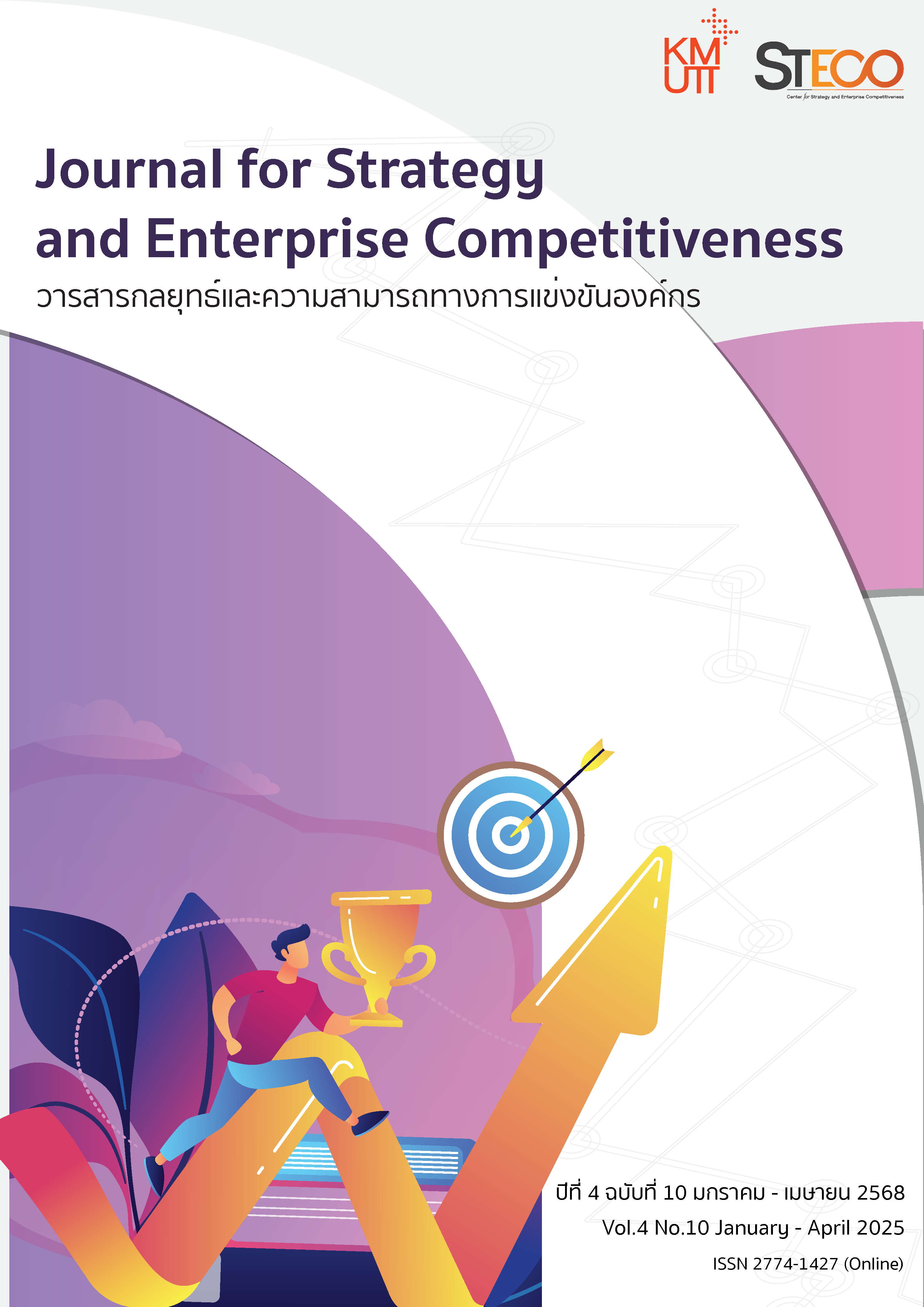Marketing Strategy 7P's Influencing the Online Fashion Clothing Purchase Decisions of Muslim Women
Keywords:
marketing mix factors, purchase decisions, online fashion clothing, muslim womenAbstract
This research aims to study the marketing mix factors (7P's) influencing online fashion clothing purchase decisions among Muslim women in Mueang District, Narathiwat Province. The sample consisted of 400 Muslim women selected using the simple random sampling method. The sample size was determined using Yamane’s formula (1973) at a 95% confidence level with a 5% margin of error. Data were collected through an online questionnaire to ensure convenience and comprehensive coverage of the target group. The data were analyzed using multiple regression analysis to identify the factors affecting purchase decisions. The results revealed that Place (distribution channels) was the most influential factor, with a mean score of 4.45 and a standard deviation of 0.50, and a regression coefficient (β) of 0.45. This was followed by Product, with a mean score of 4.35, a standard deviation of 0.56, and β = 0.38. Physical Evidence also played a significant role, with a mean score of 4.25, a standard deviation of 0.60, and β = 0.30. The analysis indicated that all marketing mix factors significantly influenced purchase decisions at a 0.05 level of significance. The findings highlight the importance of developing efficient and fast distribution channels and improving product quality to align with Islamic principles. Additionally, designing a trustworthy and user-friendly online platform is critical in enhancing consumer confidence. This study also opens opportunities for further research into online purchasing behaviors among consumers with specific religious and cultural backgrounds in other regions, which can aid in developing tailored marketing strategies.
References
Ahmed, S., & Rahman, M. H. (2015). The effects of marketing mix on consumer satisfaction: A literature review from Islamic perspectives. Turkish Journal of Islamic Economics, 2(1), 17–30.
Chansang, A. (2022). Factors influencing the decision to buy online fashion clothing among Gen Y women in Bangkok and surrounding areas [Master’s thesis, Dhurakij Pundit University]. Dhurakij Pundit University.
Chiu, C. M., Chang, C. C., Cheng, H. L., & Fang, Y. H. (2009). Determinants of customer repurchase intention in online shopping. Online Information Review, 33(4), 761–784. https://doi.org/10.1108/14684520910985710
Chotikul, N. (2023). Marketing mix factors influencing running shoe purchase decisions post-COVID-19 among consumers in Songkhla Province. 14th Hatyai National and International Conference Proceedings, 1(1), 1807–1820.
Department of Provincial Administration. (2023). General registration statistics. Retrieved from https://stat.bora.dopa.go.th/stat/GENSTAT/STATFAM/
Hassan, S. H., & Ara, H. (2022). Thematic analysis of hijab fashion from Muslim clothing retailers’ perspective. Journal of Islamic Marketing, 13(11), 2462–2479. https://doi.org/10.1108/JIMA-03-2020-0066
Johnson, T. W., Francis, S. K., & Burns, L. D. (2007). Appearance management behavior and the five-factor model of personality. Clothing and Textiles Research Journal, 25(3), 230–243. https://doi.org/10.1177/0887302X0730298
Khanthong, P., & Thanathanchuchot, T. (2019). Marketing models for online business in Thailand. MCU Buddhist Intelligence Review, 4(2), 45–56.
Kotler, P., Keller, K. L., Brady, M., Goodman, M., & Hansen, T. (2016). Marketing management (3rd edition). Pearson Higher Ed.
Lada, S., Tanakinjal, G. H., & Amin, H. (2009). Predicting intention to choose halal products using theory of reasoned action. International Journal of Islamic and Middle Eastern Finance and Management, 2(1), 66–76. https://doi.org/10.1108/17538390910946276
Maslow, A. H. (1943). A theory of human motivation. Psychological Review, 50(4), 370–396. https://doi.org/10.1037/h0054346
Pittman, M., & Abell, A. (2021). More trust in fewer followers: Diverging effects of popularity metrics and green orientation on social media influencers. Journal of Interactive Marketing, 56(1), 70–82. https://doi.org/10.1016/j.intmar.2021.05.0
Solomon, M. R. (2010). Consumer behaviour: A European perspective. Pearson Education.
Yamane, T. (1973). Statistics: An introductory analysis. John Weather Hill, Inc.

Downloads
Published
How to Cite
Issue
Section
License
Copyright (c) 2025 Journal for Strategy and Enterprise Competitiveness

This work is licensed under a Creative Commons Attribution-NonCommercial-NoDerivatives 4.0 International License.
The opinions appearing in the content of articles of Journal for strategy and enterprise competitiveness. It is the opinion and responsibility of the article author. It is not the opinion and responsibility of the Center for strategy and enterprise competitiveness, King Mongkut's University of Technology Thonburi
Articles, information, content and images, etc., in the Journal for strategy and enterprise competitiveness. It is the exclusive copyright of the Center for strategy and enterprise competitiveness, King Mongkut's University of Technology Thonburi. If an individual or entity wants to distribute all or part of the content or for any action must obtain written permission from the Center for Strategy and enterprise Competitiveness, King Mongkut's University of Technology Thonburi.


